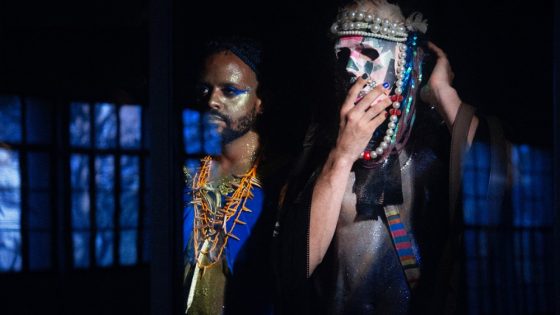Brazilian Gabriela Amaral Almeida’s “She, Crocodile,” Victoria Galardi “Hedgehogs” and “Rambler,” from Mexico’s Astrid Rondero and Fernanda Valadez, feature among the 14 projects being brought to market at San Sebastian’s Europe-Latin America Co-Production Forum.
Further titles are from admired established helmers – Argentina’s Santiago Loza, Bolivia’s Martin Boulocq – or fast emerging directors such as Cuba’s Rosa Maria Rodríguez, Argentina’s Natalia Meta, Paraguay’s Pablo Lamar and Mexico-based Natalia López Gallardo.
One of the strongest lineups in years, the showcase is powered by the allure of the biggest Latin American co-production event in Europe, the need to drive into co-production to counter rising costs and the more specific dire straits of Argentina’s film industry.
“She, Crocodile” marks the first feature from New York City and São Paulo-based South, the new production company launched by ‘Queen of the South’ lead Alice Braga and ‘3%’ star Bianca Comparato. It is directed by one of Latin America’s preeminent genre auteurs, Amaral Almeida, who leapt onto the scene with 2017’s “Friendly Beast.”
““The Hedgehogs” reps the return to filmmaking for Galardi, 11 years after “I Thought It Was a Party” having carved out a reputation for high-energy, dramedic takes on solitude and family with “Lovely Loneliness” and “Mount Bayo.”
“Rambler” sees Rondero and Valadez abandon the central Mexico and border of their first two features for a three time-period tale reflecting the “chaos, violence and vertigo” of Mexico City.
Four brief takes on the lineup and profiles of titles:
It’s Togetherness Time
Rosa María Rodríguez Pupo “Her Lightness” is produced by not just Armando Capó but Cristina Gallego and Martha Orozco. Hernan Rosselli’s “Hard-Boiled School” now has seven international production partners. 12 out of the 14 titles hit the Co-Production Forum with international co-producers already attached. The name of the game, however, is to attach a whole host of partners, compensating for ever plunging minimum guarantees paid by sales agents against foreign.
Argentina: Challenges Spark Opportunity
Five of the 14 Forum titles are from Argentina. That’s making a virtue out of necessity. A perfect storm of inflation and Javier Milei’s government has decimated film funding. And there’s no real end in sight. But as Argentina turns to multi-lateral co-production to off-set paltry state financing, that opens up the chance to work with some of the best film-making talent in Latin America – directors and producers. The cliché about challenges opening up opportunities is a cliché because it is very often true.
Uruguay Emerges
Five Forum titles are co-produced with Uruguay, nearly as many as France (six). As funding challenges mount for national Latin America film industries – not just Argentina but Mexico of major territories – Uruguay is emerging as ever more potent film force, with a pro-film government leaping at the chance to host Ventana Sur, a well-earned continent-wide reputation for production standards – not for nothing did The Mediator Studio buy Cimarron – and a cosmopolitan sector with a tradition of looking beyond its borders.
Auteur Genre Fillip
In the space of two decades, Latin America’s high-art, minimalist, sometimes radical arthouse has moved towards the mainstream, breading various derivates: Event arthouse and auteur genre movies are just two. Both are lapped up by foreign markets. So “She, Crocodile” or “Hard-Boiled School” or “The Strange Woman” look like three of the hottest packages in the lineup in market terms.
And the lineup:
“Animales de Desierto,” (aka. “Animal Print,” Santiago Loza, Argentina, Brazil, Uruguay)
Set up at Argentina’s Murillo Cine, another departure for Loza who broke out with Rotterdam Tiger winning “Strange” admired for the Rotterdam Tiger-winning “Strange” (2003) and “4 Women, Barefoot” (2005) before hitting a home-run with Cannes 2010 Un Certain Regard player “The Lips.” Here, in the immensity of the desert, in a precolonial past, Nube, Ari, Valen and Lara walk dragging a wagon, to execute a revenge, according to a Murillo description.
“A Different Garden,” (“Otro jardín,” Mariana Gil Ríos, Colombia, France)
With short “Uli,” Gil Ríos took a special mention at the Berlinale’s Generation Kplus this year. Produced by Daniela Echeverri at Medellín’s Movimiento Cine, in co-production France, the story focuses on 8-year-old Amanda. Spending holidays at her enigmatic grandfather’s home, she meets Miguel, a wild boy living in the garden, with whom he will discover hidden truths about his family.
A Different Garden
Movimiento Cine
“The Hedgehogs,” (“Los Erizos,” Victoria Galardi, Argentina, Uruguay)
Separating after 10 years of marriage, a couple takes a final seaside holiday with their young son. Galardi co-writes with Fabian Casas; Argentina’s Juan Pablo Miller, a Cannes Camera d’Or winner at Tarea Fina, and Uruguay’s director-producer Federico Veiroj (“The Moneychanger”) produce – a powerful combination. Pic will show “how painful it is to separate, how long it takes to unravel the bond that joins two people for years,” Galardi promises.

The Hedgehogs
“The Hedgehogs”
“Hard-Boiled School,” (“La escuela pesada,” Hernán Rosselli, Argentina, Austria, Uruguay, Brazil, Portugal, France, Chile, Peru)
A man is released from prison after serving a 10-year sentence for armed robbery and discovers that he is now responsible for the daughter of a former partner. Through the meticulous planning and execution of a bank robbery played out by a gang of retired thieves, “Hard-Boiled School,” reconstructs the life and work of real-life legendary heist maestro Pedro Palomar. Rosselli’s follow-up to well-received “Something Old, Something New, Something Borrowed.”
“Her Lightness,” (“La Levedad de Ella,” Rosa María Rodríguez Pupo, Cuba, Mexico, Colombia)
A standout at this week’s Locarno Open Doors. When her cancer returns, Nora (Lola Amores, “Wild Woman”), distances herself from her family, goes to live in an impoverished neighborhood and determines to decide her own destiny. Produced by a pedigreed trio – Armando Capó, Cristina Gallego and Martha Orozco – the first feature of a figure on the cutting-edge of Cuban cinema, mixing gender point and building intimate fantasy.
“Mar de Leva,” (Mariana Saffon, Colombia, France)
Elena prepares for the imminent death of her father and faces a desire she had never thought of having: that of becoming a mother. The debut of Saffon, whose “Between You and Milagros” snagged best short film at the 2020 Venice Orizzonti. Rated director-producer Franco Lolli (“Gente de bien,” “Litigante”) and Capucine Mahé at Colombia’s Evidencia Films lead produce.
“Rambler,” (Astrid Rondero, Fernanda Valadez, Mexico)
After scooping the Sundance Dramatic World Cinema Grand Jury Prize with drug cartels drama “Sujo” – going global via multiple distribution deals inked by Alpha Violet – the hit Mexican duo is developing “Rambler,” portraying the experiences of three people at the edge of a cataclysm in Mexico City. Produced by the duo’s label Corpulenta and Enaguas Cine, the project has received grants from Mexico’s Sistema Nacional de Creadores.

Rambler
“Remanso,” (Pablo Lamar, Paraguay, Brasil, Uruguay, France)
A story set during the dictatorship of Stroessner in Paraguay, following Carmen, a woman who discovers a girl was raped and murdered in the neighboring house of an influential military officer. Lamar (“Noche adentro,” “Oigo tu grito”) produces alongside Gabriela Sabaté (“Paraguyan Hammock”), this broad co-production alliance weighs in a five-way co-pro, usually an auspicious sign in a Latin American production.

Remanso
Martin Crespo @krezpoide
“She, Crocodile,” (Gabriela Amaral Almeida, Brazil, Portugal)
Starring Bianca Comparato (“Avenida Brasil”), a young and sole heiress of a luxury real estate brokerage in Rio de Janeiro gradually transforms into a hungry and deadly crocodile. “‘She, Crocodile’ arose from my need to portray violence from the perspective of capitalism and women’s issues. The film is my declaration of love for body horror, David Cronenberg and Douglas Sirk. Blood, guts and heart,’” says director Amaral. Comparato produces with Yana Chang; Alice Braga and Amaral executive produce.

She, Crocodile
Credit: South
“Solo el Amor Existe,” (Natalia López Gallardo, México, U.S., France)
Following on “Robe of Gems,” a Berlin Silver Bear Jury Prize winner which also won best director at Morelia, the second feature from celebrated Mexican-Bolivian editor López Gallardo, head of Mexican post facility Splendor Omdia. Produced by Lobo en Medio de Lobos.
“The Spirit of the Law,” (“El espíritu de la ley, Natalia Meta, Argentina)
Seen at Cinemart 2024, and produced by two Argentine prestige players, both behind “Zama,” Picnic Productions making “Las Acacias” and Rei Pictures “The Settlers.” Meta’s follow-up to Berlin competition entry “The Intruder,” here a congresswoman at the peak of her career, advocates for the approval of a crucial law she has fought for her entire life. Then she receives an accusation leading her to reconsider the true spirit of her political calling.
“The Strange Woman,” (“La Mujer Extraña,” Martin Boulocq, Bolivia, Uruguay)
During the lithium war in a future Bolivia, a Quechua teenager decides to become a surrogate to escape poverty, facing her mother’s fury and unleashing a family conflict in the midst of social turbulence, the synopsis runs. With neo-colonialism critique “Criminal Body” unspooling at Sanfic’s WIP, Boulocq’s second feature nailing global forces shaping Bolivia and the world, with Latin American powerhouse Cimarrón on board as co-producers with CQ Films.
“Tropical Malaise,” (“Malestar Tropical,” Jorge Cadena, Switzerland, France)
A group of queer activists team with indigenous communities near Colombia’s largest open-cast coal mine. Co-writers include Jacques Toulemonde, co-scribe in Ciro Guerra’s “El abrazo de la serpiente,” and the Colombian-born and Swiss-trained Cadena, whose short “Flores del Otro Patio” won a Special Jury Award at 2023’s SXSW Film Festival. Lead produced by Gabriela Bussmann and Yan Decoppet at Geneva-based GoldenEggProduction.
“The Two Landscapes,” (“Los dos paisajes,” Francisco Lezama, Argentina, Brazil)
During an institutional crisis within the Catholic Church due to Catholics converting to Evangelism, Mercedes, a devout sixty-year-old Catholic, is obliged to host the late tenant’s girlfriend and unrecognized daughter in her home. Produced by Pioneer Cine, developing projects from Lezama and Ignacio Ceroi, a “melancholic comedy” about religious and family tensions, says Lezama.
Source Agencies


